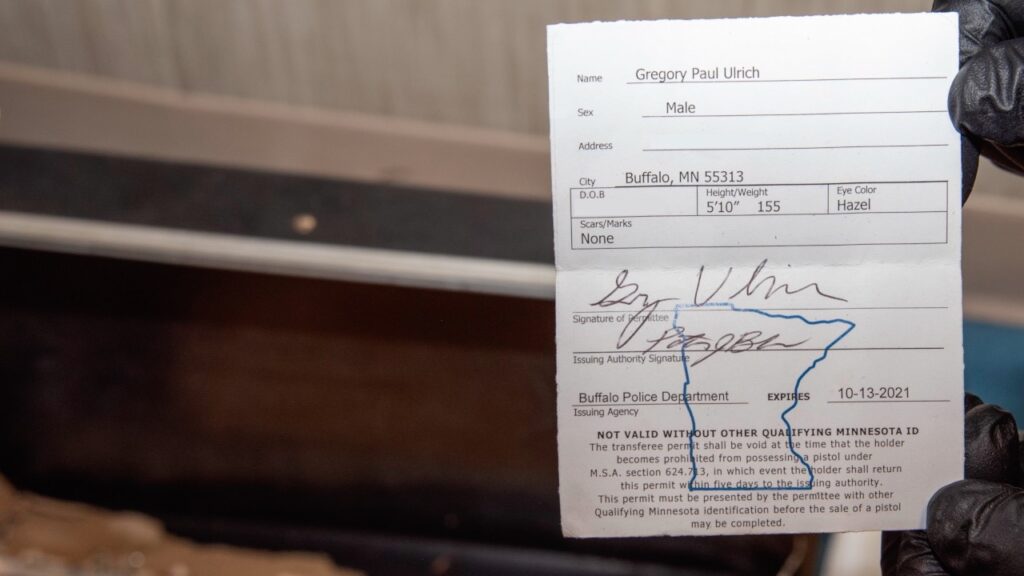More time, more discretion: Changes to gun permit law spurred by tragedy in Buffalo
More than two years after a man with a documented mental illness opened fire inside a Minnesota healthcare clinic, the state is changing a law that police say could have kept him from buying the gun.
The shooting at the Allina Health Buffalo Crossroads clinic in February 2021 killed a young mother and injured four other people.
Last year, a judge sentenced Gregory Ulrich, 69 years old, to life in prison for first-degree murder and multiple counts of attempted murder.
As 5 INVESTIGATES reported, Ulrich legally bought the Smith & Wesson handgun he used in the shooting despite a history of mental illness and his previous threats to the clinic.

Under state law, experts say police could not deny Ulrich a permit to purchase the firearm because he had no criminal convictions and never officially received a civil commitment.
Law enforcement had been begging to tweak that law and successfully lobbied the legislature to include the change in a series of gun reform bills that passed earlier this year.
More Discretion
In addition to expanded background checks and the passage of a “red flag” law, Minnesota lawmakers granted police chiefs and sheriffs more time and discretion when deciding whether to grant a permit to purchase a firearm.
Rick Hodsdon, general counsel for the Minnesota Sheriff’s Association, first spoke with 5 INVESTIGATES in 2021 about discrepancies in the law that gave sheriffs more authority to deny a “permit to carry” if they determine the applicant is a “danger to self or the public.”
But until now, the same discretion did not extend to purchase permits.
“You could have multiple arrests for violent crimes — if they didn’t result in convictions, there was no basis under state law to deny somebody a permit to acquire,” Hodsdon said. “If you said ‘no,’ you could be charged with a gross misdemeanor crime.”
Hodson said that put police chiefs at risk of losing their jobs and even their law enforcement license.
A valid permit
5 INVESTIGATES recently obtained a photo of the purchase permit issued to Ulrich by the Buffalo Police Department showing it was valid through October of 2021.
Ulrich did not have a permit to carry.
Under the new law that takes effect on August 1, police could have denied Ulrich the permit to purchase the handgun. They would have had reason to believe he was a danger to himself or others because Ulrich had previously threatened to kill people at the same clinic.
The amount of time to process those applications will also be extended from seven to 30 days.
“There are some [who] have argued that the entire permit system doesn’t prevent somebody who really wants to get a gun from getting one,” Hodsdon said. “I can tell you that I think the odds are that it would have prevented a person from lawfully obtaining a firearm… And if those people have access to the black market for firearms, the best I can tell you is at least we’re going to make it more difficult.”
Pleas for change
Melissa Kennedy, a survivor and Allina employee, was among those who testified in March about the moments of terror when Ulrich walked into the Buffalo clinic and started shooting.
“We ran, we hid, and we waited,” Kennedy told lawmakers. “We knew he was dangerous, but Minnesota did not have a law to protect its citizens from people in crisis.”
Gun rights advocates argue that existing laws should have already prevented Ulrich from getting a gun because he had been previously found incompetent to stand trial in an earlier case.
Ben Dorr, Minnesota Gun Rights director, testified against the gun reform legislation.
“This bill is an absolute slap in the face of law-abiding gun owners and an unforgivable undermining of our constitutional right to keep and bear arms,” Dorr said.
Others insist the extra discretion granted to police chiefs and sheriffs are not likely to lead to a significant increase in denials of gun permit applications.
“This is not a law enforcement effort at gun grabbing, as some might accuse them of,” Hodsdon said. “They’ve been very cautious and very judicious in their use of this provision about public safety issues.”
Buffalo Strong
Since the clinic shooting, life in Buffalo has moved on, but there are still reminders of the day that led to the movement known as “Buffalo Strong.”
Businesses such as BJ’s Deli display purple signs in their windows, and the Buffalo Strong non-profit is still a presence in the community.
“We kind of had our three C’s – care, connect, and continue,” said Sue Olmscheid, Buffalo Strong board member and president of the Buffalo Chamber of Commerce.
She says the organization has largely turned its focus to expanding access to mental health resources in the area.
While some are still uneasy about publicly discussing the tragedy that struck their small town more than two years ago, others expressed appreciation that it propelled changes to keep guns out of the hands of people like Gregory Ulrich.
“The police were very aware of his activities, but obviously couldn’t stop him from possessing a gun,” Olmscheid said. “I think that is good that the police department can have more of that big picture.”